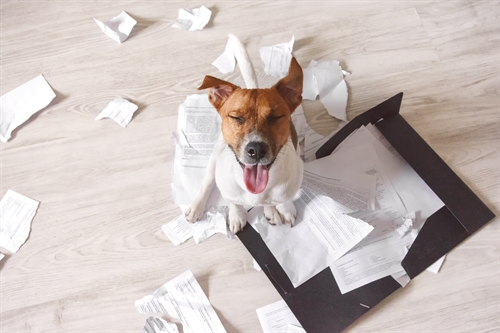Whether you are getting a puppy or welcoming a mature dog from a rescue, you know that your priorities are about to change in a big way! Dogs are unpredictable and every single one is different with their own likes, dislikes and needs. By taking a little care to get your home ready for your canine companion you can make the process smoother and more pleasant for everyone involved.
Finding room
You know you’ve got room in your heart for your new dog, but do you have room in your home? You will need to make space to store toys and other equipment, but he will also need space for sleeping and eating. Have an idea of where these spaces are – otherwise the dog may decide for himself.
You should consider confining a puppy or a new dog to a couple of rooms at first. It is easier on him, and it’s easier on you because you always know where he is. And it’s easier to protect the floors of two rooms against inevitable accidents. It’s also easier to puppy-proof two rooms, rather than the entire house. You can make a puppy space using baby gates.
Calm environment
A change of routine and home is a huge challenge for any dog. It is worth considering the environment you are bringing her into.
Dogs have an incredibly acute sense of smell, and strongly scented air fresheners or candles could cause discomfort. These items are commonly displayed in living spaces and may also be toxic if the dog eats or chews them, so consider hiding them away for the time being.
Visual clutter is stressful for people – though the jury is out on whether it stresses dogs. But if you are stressed out, then your dog may pick up on this. So it is worth clearing un-necessary items out of your home before your dog arrives.
You can move some items temporarily into self-storage, though you will have to factor in how much it costs to rent a storage unit (and we’ve got a blogpost to help you work out storage costs). You may be able to save on your storage insurance by getting a quote from Store and Insure.
Secure everything
Puppies chew, and so do some older dogs, particularly if they are stressed by a move. It’s best to assume the worst about your new dog and secure your possessions as far as possible.
Shoes may get chewed if they are not securely stored. You may have to give up on open storage for shoes and instead shut them away in drawers or a cupboard.
Cables are another chew hazard, and, worse, a dog could pull a heavy piece of electrical equipment down on themselves. Secure cables or hide them behind furniture.
Dogs may also knock down dainty tables, or items balanced on shelves, so move these out of your dog’s space.
Not safe for dogs
Any vet will tell you horror stories about dogs that have poisoned themselves with household chemicals. Avoid storing cleaning products and food in floor-level cabinets – or get locks for these so that your dog can’t get into them. Common people foods such as grapes, chocolate and onions can harm dogs too.
The Kennel Club has a list of house and garden plants poisonous to dogs which may be of use as you prepare your house.
It’s hard work getting ready for a new dog, and you can expect big changes to your lifestyle – but the years of companionship will make it all worthwhile.



